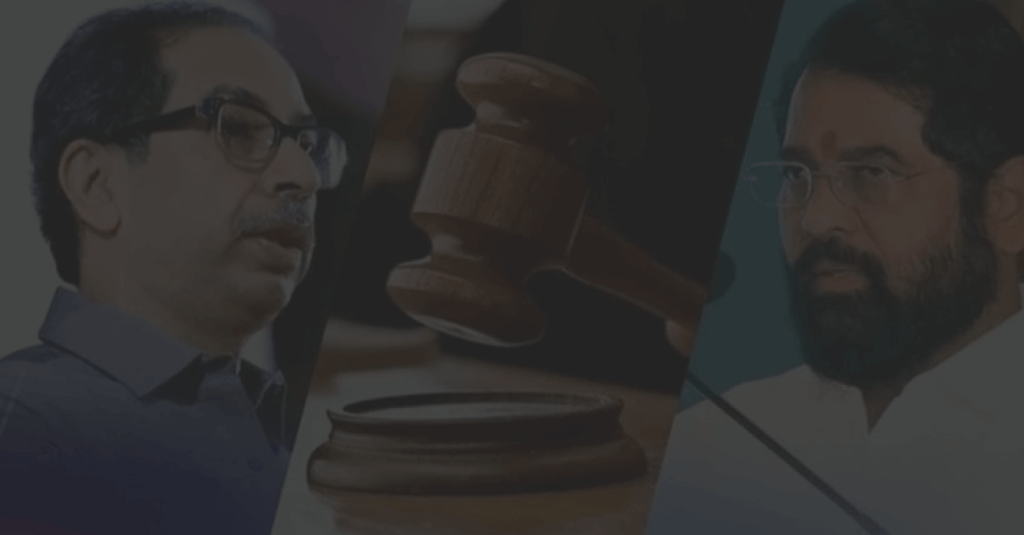The Eknath Shinde vs Uddhav Thackeray case challenges the suspension of a senior bureaucrat by the Chief Minister of Maharashtra and raises significant questions about bureaucratic independence. The Supreme Court's judgment, in this case, will have far-reaching implications on the functioning of the government machinery and the bureaucracy's independence.
Introduction:
Eknath Shinde vs Uddhav Thackeray case has been in the limelight in India. The case revolves around the powers of the Chief Minister of Maharashtra to suspend a bureaucrat. The matter has been in the Supreme Court since December 2020. The case is being heard by a Constitution Bench of the Supreme Court, which has reserved its verdict.
This blog aims to provide a detailed analysis of the Eknath Shinde vs Uddhav Thackeray case. We will look into the history, course, recent developments, and Vakilsearch’s perspective on the matter.
Eknath Shinde vs Uddhav Thackeray Case: History
The Eknath Shinde vs Uddhav Thackeray case revolves around the suspension of IAS officer Tukaram Mundhe by Maharashtra Chief Minister Uddhav Thackeray in January 2020. Tukaram Mundhe was serving as the Municipal Commissioner of Nagpur when he was suspended by the Chief Minister. The suspension was done under the powers vested with the Chief Minister under Rule 3 of the All India Services (Discipline and Appeal) Rules, 1969.
Tukaram Mundhe challenged his suspension in the Maharashtra Administrative Tribunal, which upheld the suspension. Mundhe then appealed to the Bombay High Court, which quashed his suspension in February 2020, stating that the Chief Minister did not have the power to suspend a bureaucrat. The High Court’s decision was challenged by the Maharashtra Government in the Supreme Court.
Eknath Shinde vs Uddhav Thackeray Case: Course
The Supreme Court took up the matter in December 2020 and constituted a Constitution Bench to hear the case. The Bench comprises Chief Justice of India SA Bobde and Justices NV Ramana, Rohinton Nariman, UU Lalit, and AM Khanwilkar.
During the hearing, the Maharashtra Government argued that the Chief Minister had the power to suspend a bureaucrat under Rule 3 of the All India Services (Discipline and Appeal) Rules, 1969. The Government contended that the Rule empowered the Chief Minister to take action against an IAS officer if he is of the opinion that it is necessary or expedient to do so in the public interest.
Tukaram Mundhe’s counsel, on the other hand, argued that the Chief Minister did not have the power to suspend a bureaucrat. The counsel contended that the suspension of a bureaucrat can only be done by the Central Government or the State Government, and not by an individual Chief Minister.
Recent Development
The Supreme Court has reserved its judgment in the case. The Constitution Bench heard the final arguments on 16th March 2023, and the judgment is awaited. The verdict of the Supreme Court will have far-reaching implications on the powers of the Chief Minister and the bureaucracy.
How to Get Legal Advise from Vakilsearch?
The judgment will clarify the powers of the Chief Minister and the limits to which they can exercise their powers. It will bring clarity to the judgment in the Eknath Shinde vs Uddhav Thackeray case will also have a significant impact on the bureaucracy’s functioning. The case has brought to the forefront the question of bureaucratic independence and the need for checks and balances.
Vakilsearch believes that bureaucratic independence is essential for the efficient functioning of the government. A bureaucrat’s job is to ensure that government policies are implemented effectively and efficiently, without any political interference. The bureaucracy’s independence ensures that the government machinery functions smoothly and without any biases.
However, the current case has raised concerns over the extent of bureaucratic independence. The power to suspend a bureaucrat lies with the Chief Minister, but the question is whether it should be used judiciously and in public interest. The Supreme Court’s judgment will provide clarity on this matter and ensure that the bureaucracy functions independently.
Conclusion
The Eknath Shinde vs Uddhav Thackeray case is an important one that has raised questions on the powers of the Chief Minister to suspend a bureaucrat. The case has been heard by a Constitution Bench of the Supreme Court, and the judgment is awaited. The verdict will have far-reaching implications on the powers of the Chief Minister and the bureaucracy.
In conclusion, the Eknath Shinde vs Uddhav Thackeray case is an essential case that raises significant questions about bureaucratic independence and the limits to which the Chief Minister can exercise their powers. The Supreme Court’s judgment in this case will have far-reaching implications on the functioning of the government machinery and the bureaucracy’s independence. Vakilsearch believes that the judgment will bring clarity to the issue and ensure that the bureaucracy functions independently and without any political interference.



